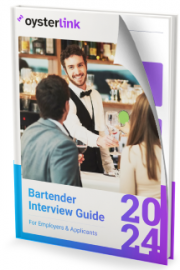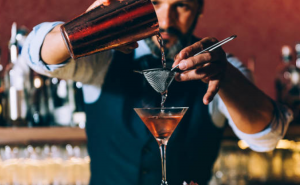2340 Bartender Jobs – December 2024 Job Listings
Here are 2340 Bartender jobs available across the United States (U.S.). Check out salaries, benefits, requirements and more in each listing.


Download the Bartender's Salary Guide & Career Handbook
- View salaries & industry trends
- Get career advice & insights
Best Bartender Jobs in the US (Available Now!)
The U.S. is the world leader in food services and drinking places. In fact, the country supports millions of hospitality jobs, including 711,140 Bartender jobs.
If you’re looking for your next bartending opportunity, check out 2340 Bartender jobs across the U.S. below.

Lead Bartender

Bartender

Bartender

Bartender

Bartender job

Bartender

Bartender

Events Bartender

Lifestyle Bartender Suite

Bartender
How Much Do Bartenders Make in the US?
The average salary for Bartenders in the United States is $37,090 plus tips per year, according to the Bureau of Labor Statistics. Salaries can go from $19,870 plus tips per year to as much as $61,210 plus tips per year.
Meanwhile, the average hourly wage for Bartenders in the U.S. is $17.83 plus tips per hour.
Legal Requirements for Bartending Jobs
While the legal drinking age across the U.S. is 21, the minimum age to be a Bartender isn’t the same in all states. States like Maine and Michigan allow individuals as young as 17 to serve alcohol.
Meanwhile, other states like New York and Florida require Bartenders or positions serving alcohol to be at least 18 years old.
Bartending license
State laws also differ in terms of whether an individual needs a bartending license to work as a Bartender. States such as New York and Florida don’t require it.
Meanwhile, a bartending license is required in Alaska and California. The laws regarding the renewal of bartending licenses vary by state as well.
Although the terms bartending “license” and “certification” are often used interchangeably, they aren’t the same thing. A bartending license is a mandatory document required by some states to legally serve alcohol.
Meanwhile, a bartending certification is a document individuals can obtain voluntarily to show they’ve received training in responsible alcohol service.
A common path for Bartenders to obtain a license is to complete a TIPS program designed for their state. TIPS programs are compliant with local alcohol service laws in each state and prove an individual can legally serve alcohol, granting them their license.
Bartender Job FAQ
Whether it’s hard to be hired as a Bartender depends on your bartending experience and the relevant skills you possess.
While it’s possible to get hired without previously working as a Bartender, you may need experience in other bar positions, such as a Barback or Waiter/Waitress. Previous positions outside the hospitality industry that involve relevant skills such as customer service and handling the cash register can also help.
To increase your chances of getting hired, you can enroll in a free online bartending course and learn more about mixology, drink preparation and bar equipment.
Some common Bartender interview questions include:
- Can you describe your previous experience in bartending?
- How do you handle difficult customers or situations?
- What cocktail recipes are you most familiar with making?
- How do you ensure responsible alcohol service?
- How do you handle a busy night at the bar?
To ace your Bartender interview, make sure to prepare confident and concise answers that showcase your bartending skills, experience, and customer service abilities.
Cities like Miami, New York City, Los Angeles and Chicago are known to offer competitive salaries for Bartenders due to their vibrant nightlife scenes and high demand for skilled professionals.
In the U.S., the minimum age requirement to apply for Bartender jobs is typically 18 years old. However, in some states, such as California, the minimum age requirement is 21 years old due to alcohol serving laws. The Alcohol Policy Information System provides an extensive list of minimum ages for Bartenders.
Key skills for a successful Bartender include knowledge of craft cocktails, efficient bar management, understanding of alcohol regulations and expertise in drink garnishing to create appealing beverages.
These skills ensure high-quality service and customer satisfaction.









